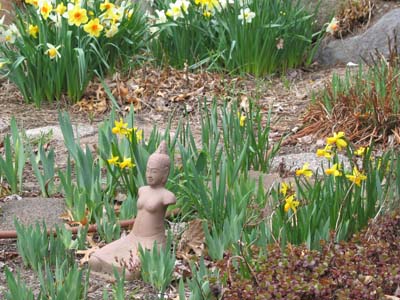Beltane Waxing Strawberry Moon
Among the many heart-rending stories related to the Gulf oil spill is one I heard on the radio yesterday.
“We are who we are because of where we are. We are Grand Bayou people, and you can’t be a Grand Bayou person if you’re living in Ohio. Grand Bayou for us is our place in the universe. This is where since time began the Creator saw fit to set our feet here. And we’re going to do whatever we have to do to remain,” Phillipe says.
There is, for me, a very important clue here about the Great Work. I haven’t mentioned the Great Work in awhile, so here’s a thumbnail. The notion comes from a book by Thomas Berry, The Great Work. He posits that each culture and era has a Great Work. Ours, he says, is managing the transition from a malign to a benign human presence on the earth.
Back to the Grand Bayou. We are who we are because of where we are. To a nation built on mobility, picking up stakes and moving the family in search of the American Dream, a heritage, in part at least, of our boat people past, Rosina Phillipe’s description of the Atakapa-Ishak people, her small tribe that lives on the Grand Bayou, has little meaning. We are who we are because of our work, the things we do, perhaps our family, but definitely not because of where we are. Because we could be somewhere else tomorrow.
This has fed a growing disconnect between Americans and the land, between Americans and feral nature (as opposed to the domestic nature composed of our built environment and our managed landscapes and farms) an urban and technology reinforced disconnect that makes us not so much insensitive as inured to feral nature so that all the waters and minerals and trees and mountains become a source of raw materials, an obstacle to progress or a distant theme park filled with exotic animals and plants.
This separation, alienation really, from feral nature makes it difficult for us to imagine an identity tied up with place, especially a place defined by feral nature and not our concrete, glass and lighted enclosures. In that alienation lies the true barrier to the Great Work, we have much less actual awareness of the earth than we imagine. With little awareness of feral nature we have trouble grasping our current malign relationship to the earth and with little insight into it we will be forever unable to foresee a benign relationship.
What we cannot see and what we cannot imagine cannot come to be.
What to do? The Grand Bayou folks have a way. Some of us can become who we are because of where we are. We can let the rhythms of our local feral nature guide us to an understanding of the fate of mother earth. We can subject ourselves to the demands of the soil while we grow food.* We can orient ourselves to the lives of feral animals, even hunting puts us closer to mother earth than potted plants on our balcony overlooking downtown. We can dig into the natural history of our home, learning about the three biomes, say, of Minnesota: The Big Woods, the Great Plains and the Boreal Woods. We can spend time in them, listening to them, learning their language.
We can reexamine the American Dream. We can ask if our perceived rootlessness (I say perceived because recent demographic studies suggest we may be slowing down, in part because of the recession) is necessary. What if, instead, we saw ourselves as citizens of watersheds? Of local ecological systems? What if we began to eat food grown or raised close to our own home? At least some of us might begin to follow the Atakapa-Ishak way and become who we because of where we are.
Then, the Great Work will follow naturally.
*This may seem like a contradiction to my inclusion of farming and managed landscapes in domestic nature, but it is not. While we grow according to the demands of our soil, not necessarily organic, but with an eye to integrated pest management, regular amendment of the soil with organic matter and growing vegetables, fruits and flowers native to your area and gardening zone, we have to listen to the land as it speaks to us. What makes it richer, more fertile? What do I need to do to live with and in touch with the place where I garden? This is very different from industrial agriculture with round-up ready crops, annually tilled fields and heavy does of chemical fertilizers.

 serious, important matters. Stop your pursuit of a mediocre gift. The tendency to judge our worth by the accumulation of things–a he who dies with the best toys wins mentality–presses us to pursue money or status, power, with all of our gifts. You may be lucky enough, as Kate is, to use your gifts in a pursuit that also makes decent money; on the other hand if your work life and your heart life don’t match up, you risk spending your valuable work time and energy in pursuit of a mediocre gift, hiding the sublime one from view.
serious, important matters. Stop your pursuit of a mediocre gift. The tendency to judge our worth by the accumulation of things–a he who dies with the best toys wins mentality–presses us to pursue money or status, power, with all of our gifts. You may be lucky enough, as Kate is, to use your gifts in a pursuit that also makes decent money; on the other hand if your work life and your heart life don’t match up, you risk spending your valuable work time and energy in pursuit of a mediocre gift, hiding the sublime one from view.